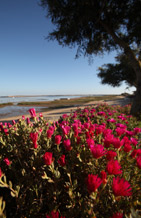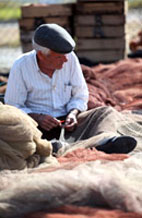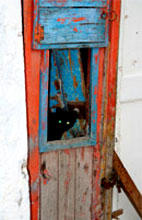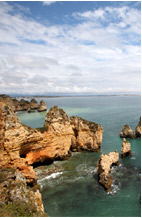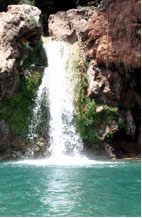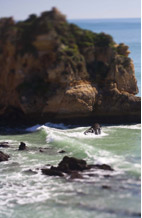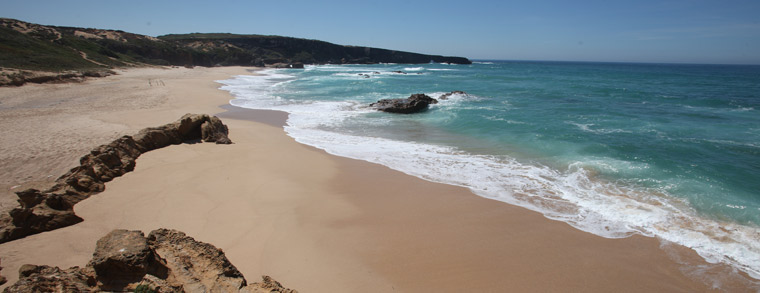location
Aljezur, southwest Portugal
The CERES International Project is based at the south-western tip of the Iberian Peninsula, near Aljezur in the Algarve. From barrier island systems, lagoons and mountain ranges with rivers and water falls and traditional towns in the hinterland, to ancient remains left behind from Neolithic, Roman and Moorish periods, the Algarve has much more to offer than the sun and sea holidays it is most famous for. The Algarve has two coast lines; south and west facing, that differ in climate and infrastructure.
37° 19´ 08´´ N
8° 48´ 49´´ W
the climate
The Algarve arguably enjoys the
best climate in Europe, with only short periods of rainfall and the longest
hours of sunshine. During the winter
months, the average temperature in the Algarve is 15°C with an average of 8
hours sunshine per day. The west coast
rarely gets too hot during the summer thanks to a constant thermal sea breeze
that sets in at lunch time.
natural park
The most striking feature of the western
Algarve is the diversity of its landscape and habitats. The richness and beauty of the location, away
from the busy tourist beaches in the south, invites experiential learning
focused on conservation and the environment, as well as being a resource for
sustainable recreation and low impact tourism.CERES is situated within the Parque Natural do Sudoeste Alentejano e Costa Vicentina, the largest stretch of the Portuguese coastline that is subject to special protection. The Natural Park is the least urbanised coastal area of Portugal and covers over 74,000 hectares of rolling hills, marshland, imposing cliffs, rocky coves and broad beaches. The park itself, classified in the Natura 2000 Network and IBA (Important Bird Area), offers opportunities for work experience and research in protected areas and land management.
the Amoreira valley
Our purpose built Field Centre will be located in
the peace, quiet and tranquility of a secluded meander of the Amoreira valley
near Aljezur. We recently had planning approval to revive an abandoned smallholding
surrounded by cork oak trees. The
closest beach (without doubt one of the most beautiful in Europe) is just down
the river that abuts the Centre property.
At high tide, you can take one of our kayaks to drift down the river
to visit the beach or borrow one of our bikes to cycle down for a swim. Aljezur, a traditional Portuguese white village with a
famous castle, is within 15 minutes walking distance of the Centre. The village provides shops, markets, butchers, a health food shop and a good variety of cafes and
excellent restaurants. 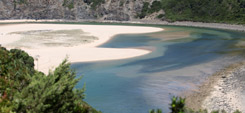 |
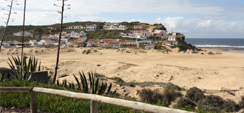 |
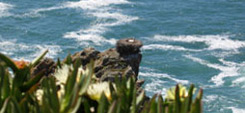 |
|
| Odeceixe meander bent |
Monte Clerigo beach |
Stork's nest on cliff top |
how to get to us
to Portugal: The mainland of Portugal is well-linked with other European countries. Most of our visitors take advantage of
the cheap flights going to Faro. Other
airports in easy driving distance are Lisbon and Seville.
As taking sports luggage gets increasingly
expensive, we would suggest borrowing one of our bikes or surfboards free of
charge if you only want to try it once or twice. If you are more serious about biking or
surfing, we can get you in touch with our local partners that have all the right equipment.
It is possible (of course!) to take a train
(check www.raileurope.com or www.trainticket.com for times and prices) or
travel by coach. Brittany Ferries
operates a service from Plymouth to Santander.
P&O travels from Southampton to Bilbao. If you are lucky you will see fin whales (Balaeno pteraphysalus) and dolphins during the
crossing.
to the Centre: There are many ways to get to us from
Faro or Lisbon. For groups, it will be
easier if we pick you up from the airport or train station with two
minivans. We will soon (hopefully!) have
electric cars powered by energy from our own solar panels to pick you up in
style (sponsors welcome!).
Portugal has a modern, reliable, and punctual public transport system. Taking the bus from Lisbon to our doorsteps
in Aljezur, is about 3.5h and is much less hassle, and far more enjoyable,
than driving yourself. The journey takes
you through the cork forests of the Alentejo and costs â¬18
(www.rede-expressos.pt). If you arrive
in Faro, there are trains leaving every 1:30h to Lagos. The journey takes about 1:40h and costs less
than â¬6. For a timetable check www.cp.pt.
From Lagos, a bus goes twice a day to Aljezur but we are also happy to
pick you up.
View Larger Map Google map of south-west Portugal indicating the location of CERES. Klick on link for directions.
exploring when you are here: You normally would not need a rental car during your stay with us. The town and two of the best beaches are in easy cycle distance from the Centre. In case you need to carry field equipment or if you are not good on foot, rental cars are plentiful and inexpensive in the Algarve. We highly recommend Luz Car (www.luzcar.com) - a local company known for their hassle free service.
responsible travel policy
We are well aware that visiting us usually involves
international travel for the majority of
students and researchers. CERES recognises the impact of air travel on the
environment, and is concerned about its contribution to climate change. To help offset the emissions from flights, we have set
up forest restoration projects at our terrestrial reserve. The cost involved in offsetting is
automatically included in our prices.
We hope that during your time with CERES, you
will experience how to significantly
reduce your environmental impact whilst, at the same time, improving your quality of life.
We believe that implementing good practice in environmental impact reduction
will not only reduce the carbon impact during your stay but also
inspire you to try some ideas back home and spread the word. We welcome creative ideas
submitted by staff, suppliers and course participants.
back

